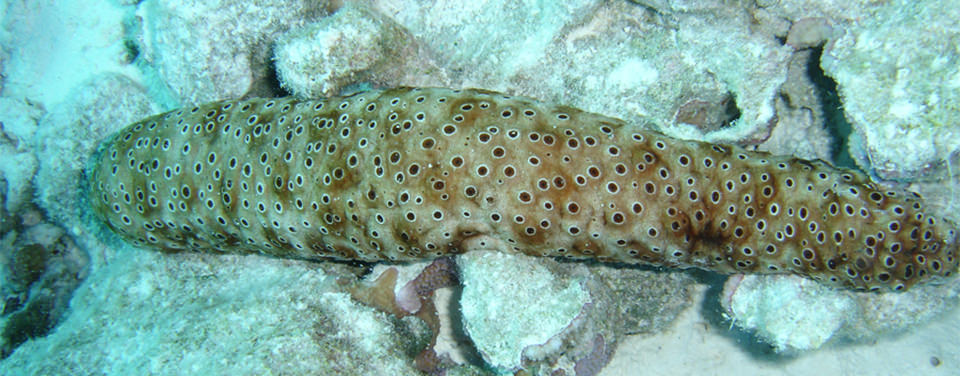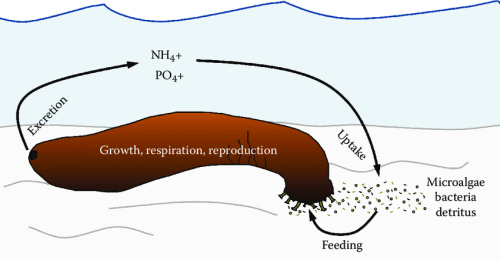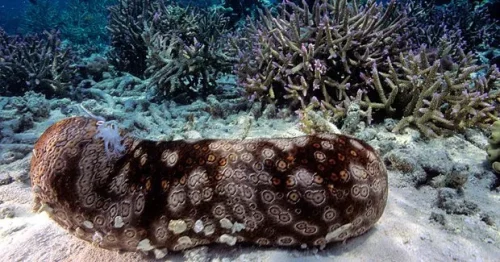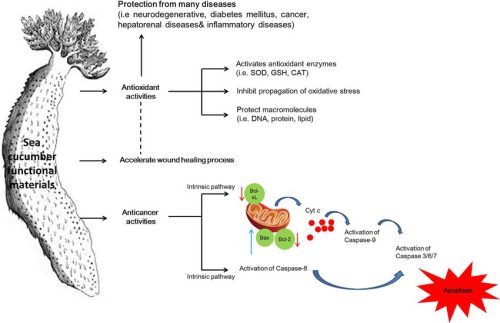Sea Cucumber: Potential and Benefits

Photo Credit : NOAA
Sea cucumber is a group of marine animals belonging to the class Holothuroidea of the Phylum Ecchinodermata. It lives in a variety of marine ecosystems around the world, from shallow waters to deep seas such as the Indian Ocean and Western Pacific ocean. The class Holothuroidea has more than 1200 species and 30 of them are the sea cucumber group.
Sea cucumbers are slow-moving animals, living on the bottom of the substrate sand, sand mud, as well as in reef environments. As an important component in Food Chain at coral reef sand its associated ecosystems at various levels of feed structure (trophic levels). Sea cucumbers play an important role as deposit eaters (deposit feeder) and suspension eaters (feeder suspension).
In the Indo-Pacific region, reef areas that do not experience exploitation pressure, sea cucumber densities can be more than 35 per m2, where each individual can process 80 grams of dry weight of sediment per day.

Photo Credit : Alamy
Some species of sea cucumber that have important economic value include: white sea cucumber (Holothuria scabra), koro sea cucumber (Microthele nobelis), pandan sea cucumber (Thelenota ananas), dongnga sea cucumber (Stichopu ssp) and several other types of sea cucumber.
It plays an important role in marine ecosystems and has a significant impact on various aspects of the environment. In marine ecosystems, sea cucumbers act as decomposing organisms. They consume organic remains that fall to the seafloor, such as dead sea leaves and other organic particles. By doing this, sea cucumbers help in the nutrient cycle within the marine ecosystem and help maintain the overall balance of the ecosystem.

Nutrient recycling by sea cucumbers. Soluble nitrates and phosphates excreted by sea cucumbers into surrounding seawater can be absorbed by nearby corals, macroalgae, microalgae, and bacteria. In turn, the nutrient composition of the microalgae and bacteria is enriched, and they can be eaten by the sea cucumber and other deposit feeders, thus forming a recycling loop in the ecosystem. (Photo Credit : Steven Purcell)
In addition, sea cucumbers also play a role in helping filter sediments on the seabed. They have a body structure that can capture small particles in water and deposit that sediment around them. This helps maintain the clarity of seawater and provides better conditions for other organisms living around them. Sea cucumber also plays a host for various types of parasites and symbionts that live on the surface of their bodies.
Ecology and conservation studies were conducted to understand the ecological aspects of sea cucumbers, including their feeding habits, reproduction and role in marine ecosystems. This study helps in the management and conservation of sea cucumbers in their natural habitat, as well as understanding the impact of overfishing on sea cucumber populations.

Photo Credit : Mike McCoy/Getty Images
The experiment, conducted by Mark Hay (School of Biological Sciences at the Georgia Institute of Technology) and Cody Clement, created a monitoring patch to evaluate coral health by treating coral reefs with sea cucumbers and coral reefs without sea cucumbers. Experimental results show that the absence of sea cucumbers on coral reefs can cause the appearance of white bands on the bottom of corals which have an impact on the death of coral reef colonies. This may explain that sea cucumbers can help suppress coral disease. Corals without sea cucumbers are 15 times more likely to die.
In coastal communities, sea cucumber is used as one of the food ingredients as well as for ingredients in traditional medicine. Research on sea cucumber has been carried out in various fields, including biology, chemistry, health and its potential use in various industries.

Photo Credit : Ratih Pangestuti
The pharmacological potential of sea cucumber as a cure for Diabetes Mellitus and heart related diseases because sea cucumber has active compounds as anti-inflammatory, antitumor, antimicrobial, antidiabetic and antioxidant and has immunomodulatory properties. Bioactive compounds in sea cucumbers such as triterpenoids, glycosides, polysaccharides and peptides are still being explored as raw materials for functional foods, which have additional health benefits in addition to basic nutrients.
Sea cucumber cultivation is also focused on developing sustainable and efficient sea cucumber cultivation methods. This includes research on feed nutrition, maintenance management, controlled reproduction and disease control to increase sea cucumber cultivation productivity.
A healthy ecosystem is important for sea cucumber survival. Some sea cucumber species, especially in the tropics, are currently at risk of overfishing due to high market demand. Unsustainable sea cucumber fishing practices can lead to a decline in sea cucumber populations and negative impacts on the overall marine ecosystem. Therefore, protection and wise management of sea cucumber populations need to be done to maintain the sustainability of marine ecosystems.
-YN

